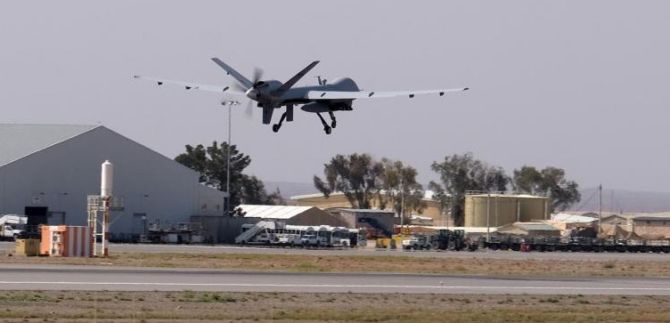 | « Back to article | Print this article |
Drones or unmanned aircraft are being used for several purposes such as mapping, survey and commercial photography, while e-commerce giant Amazon is looking to use them for deliveries to its consumers in the US.

In line with developed economies, India on Wednesday came out with a draft set of guidelines to bring the use of drones and other unmanned aerial vehicles under a legal framework.
This is likely to encourage the commercial use of such products.
In the absence of any guidelines, the amateur use of drones has so far been illegal.
E-commerce major Amazon has used a drone to deliver a bag of popcorn to an address in rural England, in the first commercial outing for a technology that is the US group’s boldest step towards automating deliveries.
According to the policy unveiled by the Directorate General of Civil Aviation (DGCA), which will be the regulating agency for such vehicles, drones have been classified into four parts based on their weight.
For the lightest category Nano, a payload of up to 250 grams and flight to a maximum height of 50 feet, a one-time registration for the operating agency is enough.
However, for an equipment which is more than 2 kg the operator has to get security clearance each time the drone is operated.
The operator should also have a special permit, which the government has assured will be sanctioned within two to seven days.
“Regulation of drones is a very difficult prospect in a country like India. We have extensively pondered over the security aspect and consulted global examples.
This is a very progressive policy which will increase the ease of doing business for drones,” Jayant Sinha, minister of state for civil aviation said.
"We are making the rules very very user-friendly," civil aviation secretary Rajiv Nayan Choubey said adding that the draft norms have been prepared after extensive consultations internally.
After stakeholder consultations, the final and formal Civil Aviation Requirements (CAR) for drones is expected to be in place by December end, he said.
Various restrictions have been proposed to ensure that the drones are used only for valid purposes.
For instance, areas under 50 kilometres from the international border would be designated 'no drone zones'.
Civil aviation minister Ashok Gajapathi Raju expressed hope that the draft norms would encourage genuine activities and discourage nefarious ones.
Currently, aircraft rules do not cover the use of drones as well as their sale and purchase.
Aviation regulator DGCA had in October 2014 restricted the use of drones and unmanned aircraft system by civilians.
India is not the first country to do so. The US tightened its rules on drones after a man was caught trying to fly a drone over the walls of the White House, in March last year.
Now, drones or unmanned aircraft are being used for several purposes such as mapping, survey and commercial photography, while e-commerce giant Amazon is looking to use them for deliveries to its consumers in the US.
However, drones are also viewed as a security risk.
The International Air Transport Association has referred to drones as a threat in airspace and called for a greater stakeholder engagement to ensure safety.
Photograph: Josh Smith/Reuters